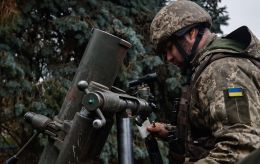Police in Tbilisi completed dispersal of protesters near parliament, which lasted all night
 Protests in Georgia (Illustrative photo: Getty Images)
Protests in Georgia (Illustrative photo: Getty Images)
On the morning of November 30, law enforcement officers in Georgia completed the clearing of Rustaveli Avenue of protesters who had gathered near the parliament building. The dispersal of the protest had been ongoing since the previous evening, according to the Georgian television channel Rustavi 2 and the local news portal News-Georgia.
The protest near the Georgian parliament in the capital took place for the second consecutive night. It was a response from the public to the controversial decision by Prime Minister Irakli Kobakhidze's government to abandon negotiations regarding Georgia's accession to the European Union until 2028.
As of the morning of November 30, the entire perimeter of Rustaveli Avenue, where thousands of protesters had gathered since the evening of Friday, was under the control of the Ministry of Internal Affairs.
Harsh dispersal
According to Georgian media reports, the current crackdown was as harsh as the previous one. Protesters were detained and arrested, often with the use of force, and there were casualties, including members of the press.
"Media outlets report numerous injuries. It appears the toll is in the dozens. Some participants in the protest suffered serious injuries and had to be carried on stretchers to ambulances. Footage of the beatings was captured by cameras," reports News-Georgia.
However, the exact number of detainees and those injured remains unclear at this time.
How Georgian police acted
Closer to the morning, security forces simultaneously moved from Bessika Street, the Rustaveli metro station, and Freedom Square, surrounding the demonstrators.
During the crackdown, protesters attempted to hide from the security forces in the Kashveti Church, 24-hour pharmacies, supermarkets, and the metro vestibule.
It is reported that throughout the night, emergency medical teams were working in the area around Rustaveli Avenue and Freedom Square.
During the night, security forces used water cannons several times against the protesters.
Currently, a small group of demonstrators remains in the area of Freedom Square and the Marriott hotel, where they had built makeshift barricades.
Municipal services are now working on Rustaveli Avenue, dismantling the remnants of the barricades. Protesters have periodically launched fireworks towards the police, while in response, security forces threw tear gas canisters.
During the night, the Georgian Young Lawyers' Association (GYLA) released a statement, highlighting that the police simultaneously used several types of special equipment: water cannons, pepper spray, and certain capsules.
Georgian lawyers pointed out that such practices are prohibited. However, the Ministry of Internal Affairs of Georgia lifted the restrictions to simplify the dispersal process.
Protests in the capital of Georgia
As previously reported, mass protests began in Tbilisi on November 28 following a statement by the Georgian Prime Minister that the government was rejecting negotiations for the country's EU membership until 2028.
Pro-Russian Prime Minister Irakli Kobakhidze explained this decision by stating that the country would not be ready for membership negotiations until that time.
Meanwhile, the protests in Tbilisi were being dispersed by security forces, who used smoke grenades, tear gas, and water cannons.
Yesterday, the Ukrainian Ministry of Foreign Affairs condemned the violent suppression of protests in Georgia.

